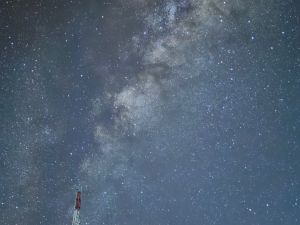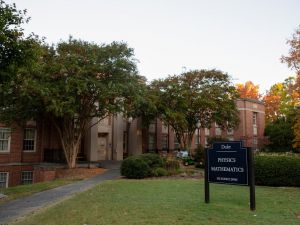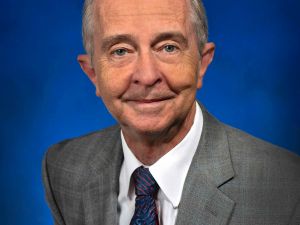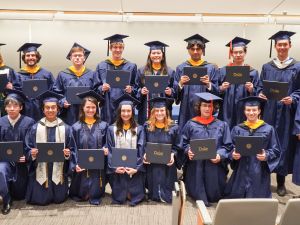Dr. Jenna Moore describes her work as “basically building really advanced Legos.” To say that description is an understatement would be an understatement in itself. Since 2018, Moore has built cryogenic instrumentation for the world’s most advanced and remote observatories, scanning the first light in the universe — the Cosmic Microwave Background — from high in the Andean mountaintops. But Moore’s path to the stars has been far from conventional. As a child growing up in the rural outskirts of Charlotte, she displayed… read more about How Jenna Moore Is Hunting the Cosmos in the World’s Driest Desert »
Quietly tucked behind Physics on West Campus, an unassuming concrete building conceals one of Duke’s best-kept secrets. The brutalist austerity and lack of signage reveal little, yet beneath its asphalt parking lot sprawls a subterranean warren of thick-walled rooms that have borne witness to sixty years of nuclear physics research.This hidden network is the Triangle Universities Nuclear Laboratory, TUNL for short, the brainchild of experimental nuclear physicist Henry W. Newson. Joining the Department of Physics in… read more about Triangle Universities Nuclear Laboratory is Self-Sustaining at Sixty »
An interdisciplinary team of Duke faculty is among the international recipients of a new grant from the Schmidt Sciences Humanities and Artificial Intelligence Virtual Institute (HAVI), a program designed to bridge the gap between AI technology and humanistic inquiry. Led by Martin Fischer, Research Professor of Chemistry and Physics; Shira Faigenbaum-Golovin, Assistant Professor of Mathematics from Bar-Ilan University (formerly of Duke); and John K. Delaney, from the National Gallery of Art in Washington, the project… read more about Duke Researchers Awarded Grant to Reveal Hidden Histories of Artworks Through AI and Imaging »
Duke’s Trinity College of Arts & Sciences has invited its faculty to submit proposals for the creation of new research initiatives on campus.Following the successful launches of the SPACE Initiative and the Society-Centered AI Initiative, the Trinity Research Initiative will support new directions for interdisciplinary research through seed funding for nascent research collaborations, community-building, and complementary educational and outreach activities.Open to all areas of research and… read more about Trinity College of Arts & Sciences Invites Proposals for New Research Initiatives »
Every year, the research intelligence company Clarivate publishes a list of Highly Cited Researchers. These researchers have multiple publications which rank in the top 1% by citation in their fields and are further selected for exemplifying excellence and integrity in their work.The Highly Cited Researchers 2025 list was recently released, and 29 Duke scholars were featured on the list of 6,868 researchers. These leading researchers hail from across Duke University, Duke Health and Duke-NUS Medical School… read more about Trinity Scholars Featured in the Highly Cited Researchers 2025 List »
JUNO seeks to answer a fundamental question about the elusive particles. So do two competing experiments coming on line in the next decade.The Jiangmen Underground Neutrino Observatory (JUNO) achieved a major milestone in August, after 10 years of construction, when it began collecting data. More than 700 scientists from 17 countries are contributing to the facility, which is the largest liquid-scintillator detector in the world. Its primary goal is to determine the ordering of the neutrino masses. read more about Kate Scholberg on the Next-Generation Underground Neutrino Detector in China Up and Running »
Calvin R. Howell, Professor of Physics, was awarded the 2025 Francis Slack Award at this year’s Southeastern Section of the American Physical Society (SESAPS) Annual Meeting. The award, presented by the American Physical Society (APS), honors "Excellence in Service to Physics in the Southeast.”Professor Howell’s research is in the area of experimental nuclear physics with emphasis on the quantum chromodynamics (QCD) description of low-energy nuclear phenomena, including structure properties of nucleons and… read more about Calvin Howell Receives 2025 Francis Slack Award from the American Physical Society »
October is Space Month. At Duke University, space research is more than just science — it's a bold journey across disciplines. This is the fifth in a series of stories featuring innovators, dreamers, and students shaping the future exploration and regulatino of the cosmos.In the early days of space exploration, satellites were rare. Each launch was a feat of engineering and ambition, sending machines far above the Earth into orbits where they could drift undisturbed.These high-altitude paths offered vast expanses of space,… read more about Don’t Look Up, Space is Filled With Junk »
In an underground facility beneath Duke's campus – the Triangle Universities Nuclear Laboratory (TUNL) – researchers are testing a new approach to radiation therapy that could transform how brain tumors are treated. Termed FLASH radiation therapy, this technique delivers the same total dose of radiation as traditional radiation therapy, but in ultra-fast bursts.A recent Duke-led study published in October in the International Journal of Radiation Oncology, Biology, Physics, "Investigating the FLASH Effect in a Rat… read more about FLASH Forward: Duke Researchers Explore Ultra-High Dose Rate FLASH Radiation Therapy for Brain Tumors »
Eve Vavagiakis constructs cameras — not the kind that capture everyday moments on Earth, but ones designed to image the earliest light in the universe. Some of these instruments are installed at the Simons Observatory, 17,000 feet above sea level in the Atacama Desert, Chile. At that altitude, scientists often need supplementary oxygen to breathe. read more about Capturing the Big Bang’s Afterglow »
A new series explores how Duke faculty are crossing disciplinary boundaries to address global challenges — from climate justice to space debris. read more about Intersections at Duke: Bridging Disciplines, Solving Problems »
The world of science and technology is replete with mysteries and challenges. In fundamental science, the nature of dark matter is a mystery that has kept scientists on their toes for decades. Is it a cloud of particles surrounding all the galaxies? And if these particles were produced in the Big Bang, could we produce them by recreating a miniature version of Big Bang at the Large Hadron Collider?In the field of technology, computer vision is a fascinating challenge. How does the brain identify objects in an image? Can we… read more about From Computer Vision to the Big Bang, With a Single Algorithm »
Four faculty in the Trinity College of Arts & Sciences were recently recognized by the Arts & Sciences Council for outstanding achievements in undergraduate teaching.Each year, the Council’s Committee on Undergraduate Teaching honors outstanding faculty for their commitment to their students, for engaging them deeply in research and scholarship, for their continued development as innovative teachers and mentors, and more.Members of the council — in collaboration with the dean's office — select… read more about Four Trinity Faculty Receive 2025 Undergraduate Teaching Awards »
A Duke patch accompanied astronaut Anna Menon to space on the Polaris Dawn mission. (Photo courtesy of Menon) The Duke SPACE Initiative (Science and Policy to Advance Cosmic Exploration) celebrated its successful launch on September 8, 2025, with an event combining ongoing research, views from space and the most traveled Duke memento in history. Directed by Dan Scolnic and Michael Troxel, the Duke SPACE initiative unites hard science with policy-making… read more about Astronaut Alum Kicks Off Duke SPACE Initiative »
The Trinity College of Arts & Sciences has launched the SPACE Initiative at Duke (Science & Policy to Advance Cosmic Exploration), a universitywide endeavor dedicated to advancing our understanding of the cosmos through interdisciplinary collaboration. All are invited to its celebratory kick-off event to be held on Sept. 8 at 4 p.m., at Penn Pavilion. The event will combine a poster presentation, a reception and a keynote talk by Duke alumna, astronaut and former Lead Space Operations Engineer at SpaceX… read more about Trinity College of Arts & Sciences Launches SPACE Initiative »
Dan Scolnic, associate professor of physics in Trinity College of Arts & Sciences, has been selected to serve as Duke’s presidential fellow for the 2025-2026 academic year. The Presidential Fellowship program was established by President Vincent Price with the objective of providing a faculty member a year-long opportunity to experience firsthand the workings of university administration.Scolnic joined Duke’s faculty in 2019 and is considered one of the nation’s leading scholars in the field of cosmology. His research… read more about Dan Scolnic Named Presidential Fellow »
The First-Year Experience in Trinity College of Arts & Sciences, designed to foster community among students, includes the longstanding FOCUS program and new Constellations cohorts. Students are encouraged to think creatively and outside of the box as they explore important and timely questions through interconnected courses. There are 16 Constellations offered in the 2025-2026 academic year. Daniel Scolnic, associate professor of Physics, will be teaching Intro to Astronomy as part of the What is the Cosmos… read more about The Limit Does Not Exist: Daniel Scolnic’s Astronomy Class Encourages Exploration »
Patrick Charbonneau, professor of Physics, came across Elizabeth Monroe Boggs by accident.Charbonneau, who specializes in theoretical soft matter and statistical physics, has always been interested in the history of his field. In 2010, as a young Duke faculty, he stumbled upon a co-author with the name “E. Monroe” while researching foundational papers from the 1940s for a problem he was working on. Later, he realized the co-author’s name changed to “E. Boggs.” Could that person be a woman? Curious because there were few… read more about Overlooked Stories, Vital Contributions: Reclaiming Women’s Place in the History of Quantum Physics »
Duke’s football stadium scoreboard is accustomed to displaying impressive images. On June 23rd, however, it had the privilege of displaying images unlike any other before: the cosmos, as seen in the first photographs released by the NSF–DOE Vera C. Rubin Observatory. From the identification of its ideal site on a Chilean mountaintop 8,684 feet above sea level to the fine-tuning of its software, thousands of researchers have played a role in ensuring that the Rubin Observatory’s extraordinarily ambitious goal — to… read more about When a Picture Is Worth a Billion Worlds: Duke Cosmologists Celebrate the Rubin Observatory’s First Images »
Tucked into an old brick building near the Eno River, which once housed a textile manufacturing business, is Quadridox — a company whose founders want to change the future of airline travel, while also making health care diagnostic testing more accurate. Quadridox uses X-rays, but not the way doctors detect broken bones. Those X-rays make pictures by passing straight through objects. Quadridox’s X-ray diffraction imaging, on the other hand, is used to analyze the structure of materials by observing how X-rays bounce… read more about Hate Airline Security Lines? A New Technology May Ease Your Pain »
A Los Alamos collaboration with Duke researchers has replicated an important but largely forgotten physics experiment: the first deuterium-tritium (DT) fusion observation. As described in Physical Review C, the reworking of the previously unheralded experiment confirmed the role of University of Michigan physicist Arthur Ruhlig, whose 1938 experiment and observation of deuterium-tritium fusion likely planted the seed for a physics process that informs national security work and nuclear energy research to… read more about Duke Physicists Part of Team Recreating Forgotten Experiment Observing Fusion »
The U.S. Department of Energy’s (DOE) Thomas Jefferson National Accelerator Facility — commonly referred to as Jefferson Lab — has announced Jens Dilling, Research Professor in the Department of Physics as its new director, effective June 30. As a highly regarded physicist and national lab leader, Dilling brings more than 20 years of experience advancing science across the DOE. Most recently, Dilling was the associate laboratory director for neutron sciences at Oak Ridge National Laboratory (ORNL), where he led… read more about Jens Dilling Appointed Jefferson Lab's Next Director »
Duke Professor Emeritus of Physics Lawrence Evans passed away on Sunday, May 25, at the age of 92. A long-standing member of the Duke University family, Evans joined the faculty in 1963 as an assistant professor and would spend the next 27 years as an active member of the Physics Department, including serving as chair from 1987 to 1997. He was deeply involved in the university community more broadly and was a leader who helped shape faculty governance at the university. Evans continued to be engaged with the… read more about Physics Professor Lawrence Evans Passes Away »
When it comes to the tiny particles that make up our universe, do you think you know more than a seven-year-old? You might — if you’ve been reading the Meet the Universe! children’s book series authored by Assistant Professor of Physics Eve Vavagiakis, a cosmologist who studies the remnants of the Big Bang and builds telescope cameras with an unprecedented ability to measure the oldest light in the Universe.Vavagiakis’ interest in science began as young child, reading books about animal species… read more about If You Think Physics is Just for Grownups, Think Again »
Eight faculty in Duke University’s Trinity College of Arts & Sciences have been honored with named professorships, effective July 1.These endowed positions recognize leadership and commitment to excellence in scholarship and research. Their recipients are outstanding teachers, mentors and researchers whose contributions are invaluable to the College of Arts & Sciences, as well as their students and colleagues.“Trinity is defined by the strength of its faculty, and we are extraordinarily fortunate to count these… read more about Eight Trinity College of Arts & Sciences Faculty Honored With Named Professorships »
Duke Physics Ph.D. alum Tyler Johnson was awarded the 2025 Springer Thesis Prize. Johnson’s award-winning thesis, “The First Indication of Neutrino-Induced Nuclear Fission,” will be published in a book series called “Springer Theses”.The series “Springer Theses” brings together a selection of the very best Ph.D. theses from around the world and across the physical sciences. The work reported in the thesis must represent a significant scientific advance.Johnson’s thesis, which was conducted under advising by… read more about Ph.D. Alum Tyler Johnson Awarded the 2025 Springer Thesis Prize »
Berndt Mueller, James B. Duke Distinguished Professor of Physics, has been elected as an honorary member of the Hungarian Academy of Sciences for his contributions to theoretical nuclear physics. Mueller is internationally known for his work on quark-gluon plasma, the high-energy state of matter believed to have existed just microseconds after the Big Bang. His research has helped shape modern understanding of how the universe evolved from chaos to order, and has played a leading role in major international… read more about Trinity Physicist Berndt Mueller Elected Honorary Member of Hungarian Academy of Sciences »
The Duke Physics department invites all to a one-day symposium celebrating Professor Tom Mehen's career, collaborations and scientific legacy. Tom Mehen, who joined Duke in 2002, passed away unexpectedly at his Chapel Hill home on December 29, 2024, at the age of 54. Across his more than two decades at Duke, Mehen made substantial contributions in the field of quantum chromodynamics and the application of effective field theory to problems in hadronic physics. As a scientific and personal tribute to a very dear… read more about Tom Mehen Memorial Symposium - May 19, 2025 »
The Physics department celebrated its 2024-2025 graduates with a diploma ceremony on Sunday, May 11 at the Love Auditorium & Hall of Science, following Duke's main commencement event. The program included a celebratory lunch and a welcome address by Professor Steffen Bass, Chair of the Physics department. Following the welcome address, Professors Ayana Arce, Director of Undergraduate Studies, John Mercer, Associate Director of Undergraduate Studies and Mark Kruse, Director of Graduate Studies,… read more about Commencement 2024-2025 »





























